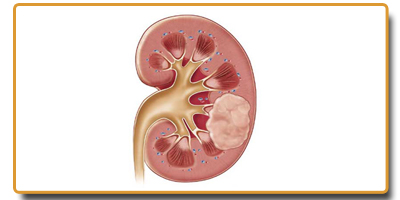
Kidney cancer can either arise from the cortex (meat) of the kidney (termed as Renal Cell Cancer) or from the part where the urine is collected and drained ( renal pelvis and ureter- usually called Transitional cell Cancers).
The two cancers behave in different fashion and the treatments are different as well.
Both the above type are found in patients with or without symptoms (therefore called incidental tumours as the patient would have had a scan for an unrelated reason.) or in patients who had scans for symptoms ( such as blood in the urine, pain in the loin, weightloss, unexplained symptoms etc.).
The scans gives the surgeon a good idea about nature of the tumour. At times, (additional procedures) ( ureteroscopy – a camera examinations under anaesthesia or a radiological guided biopsy or both) may be required to make a complete diagnosis
Once identified, the best way to manage these problems is operative intervention. Renal cell cancers usually require removal of the whole (radical Nephrectomy) or part ( partial nephrectomy or nephron sparing surgery) of the kidney depending upon the size, location and extent of the tumour.
For patients with transitional cell cancers, the kidney and the ureter ( the tube that drains the urine from kidney to the bladder) may have to be removed.
These operation can be done with a help of a robot(Robotic Nephrectomy or Partial Nephrectomy) or a laparoscope as well as by open method. The urological surgeon will guide you about the best method depending on various factors.
The patients with these cancers needs period follow up depending upon the grade , stage of the cancer and the method of treatment offered.


